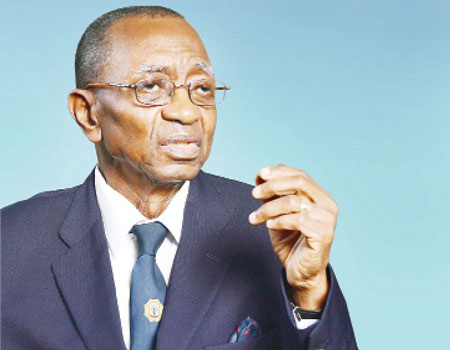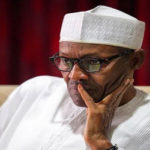Chapter Nine
Appointment as Vice Chancellor

Background in Hindsight
In early 1987, I returned to the university after a three-year stint as executive secretary of the West African Postgraduate Medical College (WAPMC). When I paid a courtesy visit to the provost, College of Medicine, Professor Ayodele Falase, he sought my view on a matter which, unknown to me, was being hotly debated among the academic staff of the college—whether non-medically qualified persons should be appointed as head of the Department of Preventive and Social Medicine (PSM), which was a ‘clinical department’. I answered in the affirmative, gave reasons for my position and promised to send him a memorandum on the matter. Sometime later, the matter was listed on the agenda of a meeting of the Academic Board of the College. I was very surprised to see the passion with which majority of the participants at the well-attended meeting insisted that only medically qualified persons should head PSM. In my contribution to the debate, I requested that my dissension should be noted in the minutes for posterity.
At a meeting of the Senate in 1989, the decision of the academic board was presented as a recommendation for approval by the Senate. There were a lot of people in attendance at that meeting because, among other things, the election of a new deputy vice-chancellor was being held. I was the proposer of one of the two contestants, Professor Obaro Ikime. Towards the end of the meeting, while the votes were still being counted, the vice- chancellor, Professor Ayo Banjo, called on Professor Falase to present the recommendation from the College of Medicine. After his presentation, several hands, including mine, were raised to request permission to comment on the matter. In my preamble, when I was invited to speak, I outlined my credentials as a physician, an active member and former officer of the Nigeria Medical Association (Oyo State Branch), former head of PSM, fellow and examiner of both the Nigeria Postgraduate Medical College and the West African College of Physicians and the immediate past executive secretary of the West African Postgraduate Medical College (W APMC). I then proceeded to de-bunk all the reasons offered by the college in support of its recommendation. There was deafening silence in the Senate Chamber when I finished speaking. Moments later, when the vice-chancellor put the question, the recommendation was rejected loudly. It is pertinent to state that Professor Ikime lost the election to Professor P. O. Bodunrin. However, the latter resigned as DVC in 1990 to take up an appointment as vice-chancellor, University of Ado-Ekiti. I resisted the intense pressure by several friends and colleagues for me to contest the election held to fill the vacancy. Rather, on his request, I pledged my support to Professor Olusola Akinyele, who was elected to serve the unexpired term of Professor Bodunrin.
Emergency Meeting of Senate
It was also in 1989 that the federal government ordered the closure of some universities, including the University of Ibadan. The circumstances were such that many of us felt that the decision was not impartial. I felt strongly that the Senate should meet to debate the matter. Therefore, in keeping up with the regulations guiding the Senate, I spearheaded the collection of the signatures of 41 members of the Senate to request for an emergency meeting. The vice-chancellor duly complied. In order to ensure a focused, objective and fruitful debate, a small group met and identified specific issues for decision-making. At the meeting of the Senate, the vice-chancellor invited me to initiate the debate by outlining the reasons we requested for the meeting. Subsequently, the proceedings went very well and ended with the adoption of a communiqué which the vice- chancellor was mandated to forward to the minister of education and, if need be, publish in the national newspapers.
Election to Council
Much later, I learnt that my role in that debate and in the earlier rejection of the academic board’s recommendation on headship of PSM had raised my profile among the academic staff, especially on the main campus. This was an unintended and unexpected development as I discovered in 1990 when, on the proposal of my friend, Professor David Okpako, I contested and was elected to the council of the university to serve the unexpired term of Professor Adebayo Olumide, who had gone to Saudi Arabia on leave of absence. When the government reconstituted the council in September 1990, one of the new members was Chief Ben Olinmah, with whom I had closely interacted when I was secretary of WAPMC and he was the linkman of the Federal Ministry of Health with the WAPMC and WAHC. It was a happy re-union which had a far-reaching impact on my career. At a meeting of the Council in February 1991, under ‘Any other Business’, the chairman, Alhaji Liman Ciroma, announced that the second and final term of Professor Ayo Banjo would end on 30 November 1991. He proposed that action should be initiated for the selection of his successor. To that end, he invited council to elect representatives who would serve on the statutory Joint Council/Senate Committee for the selection of a vice-chancellor. Because the election did not involve the Senate representatives on the council, Professor O. Funmilayo and I continued with our conversation, until the conclusion of the short exercise when the chairman formally ended the meeting. The whole thing had meant nothing to me, so I was taken by surprise when, as I crossed the door of the Council Chamber, I heard a voice say: “Kayode you must express interest in that post.” I dismissed the ‘instruction’ but it was repeated at intervals during the following week or so. Therefore, I sought the views of a colleague who advised me to discuss it first with my wife because her life and work would be significantly affected by my appointment as vice-chancellor. If my wife agreed, I should proceed. After Tola readily gave her support, it dawned on me that I did not know what the procedure involved or what I should do next. On enquiry, I learnt that nominations would be submitted to the Joint Council/Senate Committee, which would deliberate, select and forward the names of three nominees to the visitor (head of state), who would then appoint one of the nominees. I was advised to approach one or more members of the council and seek their nomination. So, I discussed separately with Chief Olinmah, Alhaji M. T. Usman, Sarkin Lere and Mrs. Joke Coker. All of them agreed to nominate me and requested for my curriculum vitae. I also informed other members of the council, including Professor Akinyele, the deputy vice-chancellor. I told the latter that I expected he would be a candidate and I was confident that either of us who got appointed would enjoy the support of the other. I also held one-on-one illuminating discussions with several academic staff in various faculties. In the course of the discussions and consultations, I learnt with surprise that the Joint Council/Senate Committee did not conduct formal interviews of candidates being considered for appointment. Therefore, I prepared and distributed to them a document titled Thoughts on the University of Ibadan, in which I outlined my perceptions on the problems of the university, the way forward and my priorities and strategies for running the institution. The document is reproduced as an appendix in this book. Sometime later I learnt that the Joint Council/Senate Committee had met, and my name was one of the three recommended to the visitor. For several months thereafter, there was no development except for the re-election of Professor Akinyele as DVC with effect from 1 August, 1991. The matter drifted out of my mind especially after my tenure on the council expired on 31st July 1991. I felt that I had carried out the ‘spiritual instruction’ to express interest in the post of vice-chancellor and, so to say, the ball was no longer in my court. Then one day at a social function, the details of which I no longer recollect, someone suddenly asked if I was interested in the post of vice-chancellor of the Obafemi Awolowo University, Ile-Ife. I was taken aback and could not determine whether it was a mere light-hearted banter or a kite being flown on behalf the speaker or someone else. In any case, I retorted that I had expressed interest in the specific post of vice-chancellor of the University of Ibadan, rather than a career position of vice-chancellor.
Announcement of Appointment as Vice-Chancellor
Friday, 29 November 1991, was a very long, unusual and unforgettable day in my life. It was my first day at the office after a three-week absence. I had travelled to Geneva on 6 November to attend a meeting of the WHO Expert Committee on Schistosomiasis. At the meeting, I was elected rapporteur, much to my surprise and chagrin. The preferment was a great honour, but it involved more work than usual. It also meant that I could not leave Geneva early as planned to spend two days with my grandchildren, Adedamilotun and Adesekemi, and their parents, Kemi (my eldest daughter) and Damola. The children were very disappointed that I could only spend one day with them before proceeding to America. They made the most of my short stay by, among other things, insisting on sharing my bed.
My visit to America was to attend a WHO meeting on age-associated dementia at the National Institutes of Health, Bethesda, Maryland, on 18 and 19 November. Professor Kayode Osuntokun, a leading participant at the meeting, was the principal investigator for a collaborative international cross-cultural study of age-related dementia at Ibadan and Indianapolis. I spent much of my stay in Bethesda battling jet-lag. Unfortunately, Osuntokun and I had to return to Nigeria as soon as the meeting ended because we were part of a group organizing a festschrift in Lagos for Professor Thomas Adeoye Lambo, who had recently returned to the country after serving the WHO in Geneva for about twenty years, first as assistant director-general, and then as deputy director-general. The event was held on Saturday, 23 November. I joined the family in Ikenne two days later to celebrate the birthday of Yeyeoba H.LD Awolowo, my mother-in-law. Then followed a nationwide stay-at-home order. It was issued to facilitate the country’s latest attempt at conducting an accurate census. The ‘home arrest’ ended on Thursday, 28 November.





